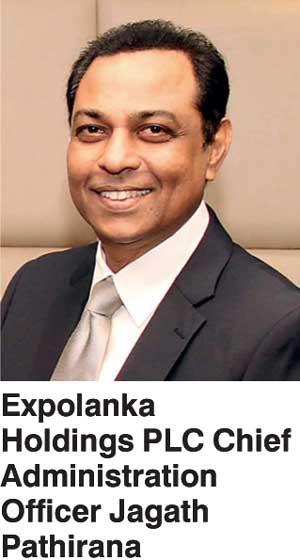Monday Feb 23, 2026
Monday Feb 23, 2026
Monday, 8 January 2018 00:00 - - {{hitsCtrl.values.hits}}
Leading global logistics provider, Expolanka Freight (EFL) once again set a new industry benchmark with the obtaining of the ISO 14064 certification for the second consecutive year in recognition of its outstanding efforts in recording, monitoring and reducing greenhouse gas emissions across its entire scope of operations.

EFL’s ISO 14064 certification further consolidates the company’s position as a leader in the field of sustainability within the logistics sector, having been the first logistics service provider (LSP) in Sri Lanka to have obtained ISO status in 2016.
“EFL’s success in once again obtaining ISO 14064 certification stands as further evidence of our firm commitment to driving sustainable business practices across the entire scope of our operations. Our certification further cements EFL’s place as a true leader in sustainability,” Expolanka Holdings PLC Chief Administration Officer Jagath Pathirana said.
In total, EFL recorded GHG emissions of 7314.63 tCO2e across all its 10 operational locations across the country during the fiscal year ended March 2017. Primary contributors to this value were Hired Vehicles, Company Owned Vehicles, and Leased Vehicles for Cargo Warehousing and Trucking Purposes, which were 72.3%, 5.5% and 2.3% of the total emissions respectively. In total, this accounts for 80.1% of the total GHG emissions of the company.
“Given that our industry tends to have a larger carbon footprint that others in the service sector, we are pleased to report that EFL has continued to make progress in terms of reducing its emissions over the past year. These efforts are reflected in a reduction of Scope 1 emissions by 73.03 tCO2e while emissions generated from purchased electricity was reduced by 192.60 tCO2e reflecting the growing contributions of our investment into solar power at the EFL campus.
“Moving forward, we will endeavour to maintain and further improve on these impressive achievements, as part of an overarching strategy to encourage and foster sustainable practices such as the formulation of Carbon Management Plans and stringent carbon accounting across the entire freight and logistics sector,” Jagath added.
The EFL Campus location has been successfully generating electricity using solar power since it was first established in September 2016. Solar energy generation during the period from September 2016 to March 2017 stood at 460,256 kWh in turn enabling emissions reductions of 171.17 tCO2e during the assessment period.